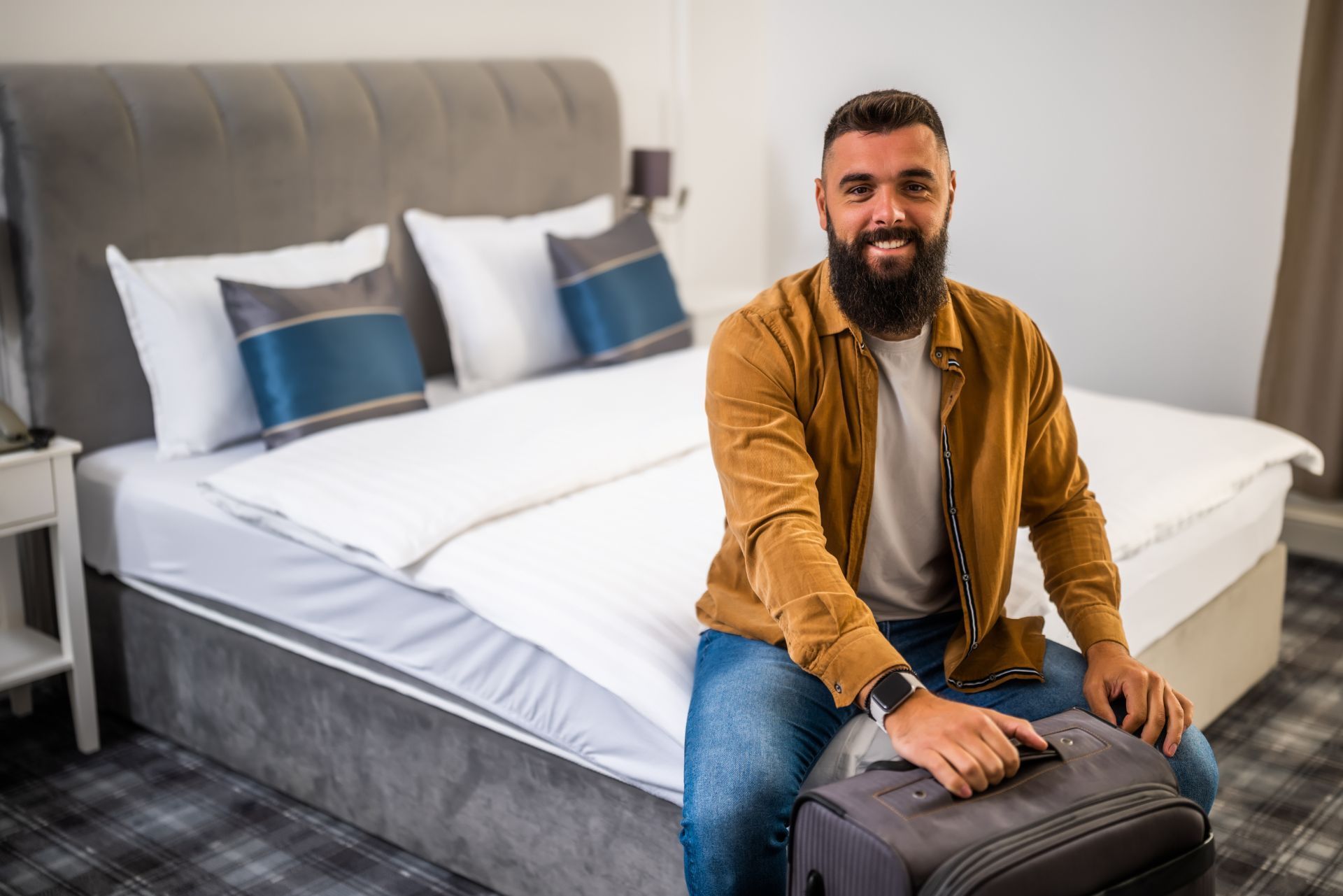Top 3 Recommended Policies

By: David Graves
Licensed Personal Insurance Specialist
425-320-4280
From Seattle’s hip micro-lofts to Leavenworth’s alpine chalets, short-term rentals have surged across Washington over the past decade. Tourists, business travelers and remote workers alike flock to the Evergreen State, and more homeowners are turning spare rooms or second homes into profitable listings. Yet many hosts underestimate the financial fallout that can follow a single mishap. The right insurance safeguards earnings, property and peace of mind, but the maze of policies, exclusions and local rules can feel overwhelming. This guide unpacks everything Washington hosts need to know about Airbnb insurance—without jargon, scare tactics or sales pitches.
The Short-Term Rental Boom in Washington State
Vacation rentals were once confined to coastal beach houses and mountain cabins. Today, nearly every Washington county records active Airbnb or Vrbo listings. Data firm AirDNA counted roughly 32,000 active Washington short-term rentals in late 2023, up from about 10,000 in 2016—an increase of more than 220 percent. Seattle alone hosts around 7,500 active units, while Chelan, Spokane, Whatcom, and King counties round out the state’s top markets.
This explosive growth is driven by tourism—Washington welcomed 102 million visitor trips in 2022—and by a cultural shift toward flexible work. A Washington State University survey found that 38 percent of remote workers planned to combine work and leisure travel within the state in 2024. Those travelers often pick furnished rentals over hotels, boosting occupancy and nightly rates.
The appeal of short-term rentals extends beyond mere convenience; they offer unique experiences that traditional hotels often cannot match. Many listings feature local decor, personalized touches, and proximity to attractions that allow guests to immerse themselves in the local culture. For instance, a stay in a quaint cabin in the San Juan Islands can provide not only stunning views but also access to local seafood markets and artisanal shops, creating a more authentic travel experience. Additionally, hosts often provide insider tips on hidden gems in the area, enhancing the overall enjoyment of the visit.
Moreover, the economic impact of this rental boom is significant. Local economies benefit from increased spending on dining, entertainment, and activities, as visitors seek to explore their surroundings. Communities that embrace short-term rentals often see a revitalization of neighborhoods, as property owners invest in renovations and improvements to attract guests. This influx of visitors can also lead to more job opportunities in hospitality and tourism-related sectors, contributing to a more robust local economy. However, this rapid growth has also sparked discussions about regulation and the need for policies that balance the interests of residents, visitors, and local businesses.

Why Specialized Insurance Matters for Hosts
Many first-time hosts assume a standard homeowners or landlord policy is enough. Unfortunately, most traditional policies either exclude short-term rental activity entirely or restrict coverage to a handful of rental days per year. Damage caused by a paying guest can be treated as a “business activity,” meaning claims may be denied outright.
The financial stakes are high. Average Washington property values top $623,000, and a single kitchen fire can cause tens of thousands in repairs. Liability is equally critical: if a guest slips on a wet deck or is injured by a broken stair rail, medical bills, lost wages and legal fees can soar. Washington’s joint-and-several liability doctrine can hold multiple parties fully liable, leaving a host’s personal savings, retirement accounts and even future wages at risk.
Moreover, specialized insurance for hosts often includes coverage for lost income due to property damage or unforeseen events, such as natural disasters. This is particularly important in a state like Washington, where the threat of earthquakes and wildfires looms large. If a host's property becomes uninhabitable due to such an event, having the right insurance can mean the difference between financial stability and devastating loss. Additionally, many specialized policies offer protection against theft or damage caused by guests, which is a common concern for hosts who may not know their renters personally.
Beyond just property and liability coverage, specialized insurance can also provide hosts with access to valuable resources, such as legal assistance and risk management advice. This can be crucial in navigating the often complex regulations surrounding short-term rentals, which can vary significantly by city or county. For instance, some municipalities may require specific permits or impose restrictions on the number of guests or rental days, and being informed can help hosts avoid costly fines. Thus, investing in specialized insurance not only safeguards a host's physical property but also empowers them to manage their rental business more effectively and confidently.
Understanding Washington’s Regulatory Landscape
Washington hosts must navigate a patchwork of state and local rules. At the state level, short-term rental operators must collect and remit sales tax (currently 6.5 percent) and lodging taxes, which vary by county and city. They must also provide guests with information on emergency exits, parking and trash collection under RCW 64.37.
Several municipalities impose additional requirements. Seattle mandates a short-term rental operator’s license and limits most hosts to two units—their primary residence plus one additional. Spokane requires a $124 annual permit and proof of $1 million in liability coverage. Leavenworth goes further, capping vacation rentals at 10 percent of housing stock and requiring annual safety inspections. Failing to comply can void insurance coverage if an incident occurs while operating illegally.
Moreover, the regulatory environment in Washington is continually evolving, reflecting the dynamic nature of the short-term rental market. Recent discussions among lawmakers have focused on potential new regulations aimed at addressing concerns about housing affordability and neighborhood integrity. As cities grapple with the impact of short-term rentals on local housing markets, operators must stay informed about proposed legislative changes that could affect their business operations. For instance, some local governments are considering stricter caps on the number of short-term rentals or even moratoriums on new permits to ensure that long-term housing remains available to residents.
In addition to regulatory compliance, hosts in Washington must also be aware of the importance of maintaining good relationships with neighbors and the community. Effective communication and transparency can help mitigate potential conflicts and foster a positive environment for both guests and residents. Many hosts are finding success by engaging with their neighbors, providing clear guidelines for guest behavior, and addressing any concerns proactively. This community-oriented approach not only enhances the guest experience but also contributes to a more sustainable and harmonious coexistence within the neighborhoods where short-term rentals operate.
Airbnb’s Host Guarantee and Host Protection Insurance: What They Cover—and What They Don’t
Airbnb markets two built-in programs that sound reassuring but have critical holes:
AirCover for Hosts (formerly the Host Guarantee) advertises up to $3 million in property damage protection. However, it is not an insurance policy and does not cover wear and tear, mold, ordinary maintenance, fine art, cash, securities or shared areas outside the listing. This means that while a host might feel secure in the event of significant damage caused by a guest, they could still be left vulnerable to the costs associated with everyday upkeep or unforeseen issues that arise from the natural aging of the property. For example, if a guest accidentally spills wine on a vintage rug, the host would need to absorb the cost of cleaning or replacement entirely, as such incidents fall outside the scope of the protection offered by AirCover.
Host Liability Insurance provides up to $1 million if a guest is injured or their belongings are damaged. Yet exclusions include intentional acts, communicable diseases, product liability (think faulty appliances) and certain breeds of dog. Defense costs can erode the limit, and coverage is excess over any policy you already carry. This means that if a guest were to trip over a loose floorboard and sustain an injury, the host might find themselves facing significant legal fees that could quickly deplete the coverage limit. Furthermore, hosts who have pets should be particularly cautious, as certain dog breeds are excluded from coverage, potentially leaving them liable for any incidents that may occur. It’s crucial for hosts to thoroughly review their own insurance policies and consider additional coverage options to fill in the gaps left by Airbnb’s offerings, ensuring they are adequately protected against a range of potential liabilities.
Key Risks Faced by Washington Hosts
Property damage beyond accidental spills. Parties, smoking, and pets can result in carpet replacement, broken furnishings, and deep cleaning far exceeding deposits. Additionally, the unique environmental conditions in Washington can exacerbate wear and tear on properties. For instance, the high humidity levels in coastal areas can lead to mold growth, damaging walls and furniture, while the dampness can also affect the integrity of wooden structures. Hosts must be vigilant in maintaining their properties, conducting regular inspections, and investing in protective measures such as furniture covers and moisture barriers to mitigate potential damage.
Liability claims tied to the Pacific Northwest climate. Rainy sidewalks grow slippery moss; icy driveways in the Cascades create slip-and-fall hazards. Guests unfamiliar with woodstove operation may cause chimney fires. Furthermore, the region's unpredictable weather patterns can lead to additional risks, such as flooding during heavy rains or falling branches during windstorms. Hosts should consider implementing safety measures, such as providing clear instructions on the use of heating appliances and ensuring that walkways are well-lit and free of debris. Regular maintenance of outdoor areas can also help prevent accidents, as can the installation of non-slip surfaces in high-traffic areas.
Wildfire and smoke exposure. Eastern Washington hosts have seen entire seasons disrupted by evacuations and hazardous air quality. Standard homeowners policies cover fire but not lost rental income without an endorsement. The increasing frequency of wildfires in the region has prompted many hosts to reassess their insurance needs, seeking policies that offer comprehensive coverage for both property damage and loss of income during emergencies. Moreover, the smoke from distant fires can infiltrate homes, leading to health concerns for guests, particularly those with respiratory issues. Hosts may want to invest in air purifiers and provide clear communication about air quality conditions to ensure guest safety and comfort.
Types of Insurance Policies to Consider
Hosts generally choose between three approaches: modifying an existing homeowners policy, purchasing a landlord or commercial policy, or selecting a specialty short-term rental policy.
Homeowners Policy Endorsements
Some carriers, such as PEMCO and State Farm, offer short-term rental endorsements. They may allow 30–90 rental nights per year and extend personal liability. This option suits occasional hosts but rarely covers business income or liability once rental nights exceed the stated threshold.
Landlord (Dwelling) Policies
Traditional landlord policies treat the property as a long-term rental. Coverage often includes property, loss of rental income and landlord liability. Many insurers classify stays shorter than 30 days as commercial, making a standard landlord form insufficient unless an additional rider is purchased.
Specialty Short-Term Rental Policies
Companies such as Proper Insurance (underwritten by Lloyd’s of London), CBIZ Vacation Rental Insurance and Safely offer policies built around platforms like Airbnb and Vrbo. They combine property, business income and $1-5 million in commercial general liability and can replace or complement existing homeowners coverage. Policies are written on a commercial form, so claims stemming from business activity are covered by design.
Umbrella liability policies can layer an extra $1–5 million above the base policy, but most carriers require underlying commercial coverage first.
Comparing Leading Insurers Available to Washington Hosts
Proper Insurance provides replacement-cost property coverage, bed bug remediation and liquor liability for hosts who supply alcohol. It is widely accepted by lenders and costs roughly $2,000–$3,500 annually for a three-bedroom home near Leavenworth valued at $700,000.
CBIZ Vacation Rental Insurance targets smaller, owner-occupied listings and often comes in under $1,800 per year for a two-bedroom condo in Seattle. Business income coverage kicks in after a 72-hour waiting period, and liability limits can be dialed up to $2 million.
Slice on-demand insurance charges a nightly rate—usually $7–$9—to cover a booking. This pay-as-you-go model helps occasional hosts who want robust protection without an annual policy.
Traditional carriers such as Allstate, Farmers and American Family now offer endorsements or specialized products. Premiums vary widely; some restrict coverage to primary residences while others allow multiple properties.

Cost Factors and Typical Premiums
Premiums for specialty short-term rental insurance in Washington typically range from $1,000 to $4,000 per year, depending on:
- Location risk: wildfire exposure in Wenatchee or coastal flood risk in Ocean Shores can add 15–30 percent.• Construction and age: newer, fire-resistant homes score discounts.• Liability limit: $2 million costs roughly 10–15 percent more than $1 million.• Amenities: hot tubs and pools raise liability premiums; security systems and sprinklers reduce them.
Tips for Reducing Risk and Premiums
Install monitored safety devices. Smoke detectors, CO alarms and water-leak sensors earn carrier discounts and help mitigate losses.
Write a detailed house manual. Clear instructions for fireplaces, hot tubs and steep driveways curb accidents. Include local emergency contacts and evacuation routes—a plus in wildfire zones.
Screen guests within Airbnb guidelines. Require verified IDs, look for positive reviews and communicate house rules upfront. Fewer damage incidents mean a cleaner claims history and lower future premiums.
Filing a Claim in Washington: Step-By-Step
1. Ensure everyone’s safety, contact emergency services if needed, and document the scene with timestamped photos or video.2. Notify Airbnb through the Resolution Center within 72 hours. Start the official Host Damage Protection claim if you plan to use it.3. Contact your insurer’s claims hotline. Provide policy numbers, booking confirmation and any guest correspondence.4. Obtain repair estimates from licensed Washington contractors; insurers often request at least two.5. Keep receipts for temporary lodging or lost income. Specialty policies usually reimburse revenue based on past occupancy data.6. Cooperate with adjusters, schedule inspections promptly, and follow up in writing.
Frequently Asked Questions
Do I need both Airbnb’s coverage and a standalone policy?Yes. Airbnb’s programs are secondary and riddled with exclusions. A dedicated policy becomes the primary layer of protection.
Can a condo association stop me from hosting?Condominium declarations often restrict short-term rentals, and violating them can void insurance if the activity is considered illegal. Always confirm bylaws before listing.
Is my personal property covered?Specialty policies usually cover furnishings, electronics and linens at replacement cost. Personal items like jewelry and artwork may require scheduled endorsements.
What happens if a guest sues both me and Airbnb?Airbnb’s liability policy may defend itself first, but hosts can still be named individually. Having your own liability coverage ensures separate legal representation and limits that won’t be exhausted by another party’s defense.
Conclusion
Washington’s short-term rental market shows no signs of slowing, yet the financial risks are just as real as the revenue potential. Standard homeowners policies rarely address those risks, and relying solely on Airbnb’s Host Guarantee invites unpleasant surprises. By understanding local regulations, evaluating specialty insurance options and employing smart risk-reduction strategies, hosts can protect their investments and focus on what matters—delivering memorable guest experiences in one of the most scenic corners of the country.

